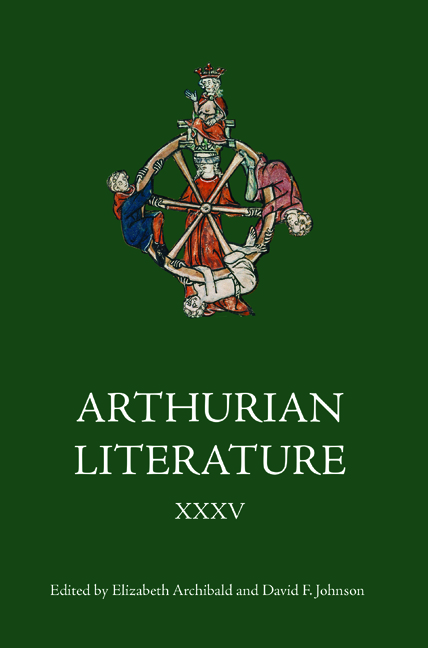Book contents
- Frontmatter
- Contents
- List of Illustrations
- General Editors’ Foreword
- List of Contributors
- I Arthurian Swords I: Gawain’s Sword and the Legend of Weland the Smith
- II Rex rebellis et vir pacificus: Civil War and Ecclesiastical Peacekeeping in the Vita Gildae of Caradog of Llancarfan
- III Once and Future History: Textual Borrowing in an Account of the First War of Scottish Independence
- IV ‘Me rewes sore’: Women’s Friendship, Affect and Loyalty in Ywain and Gawain
- V The Sacred and the Secular: Alchemical Transformation in The Turke and Sir Gawain
- VI ‘The native place of that great Arthur’: Foreignness and Nativity in Sixteenth-Century Defences of Arthur
- VII John Steinbeck’s ‘Wonder-Words’
- VIII The Once and Future King of Atlantis: The Arthurian Figure in Geoff Johns’s Aquaman: Death of a King
- IX Arthur and/or the Grail
- Miscellaneous Endmatter
II - Rex rebellis et vir pacificus: Civil War and Ecclesiastical Peacekeeping in the Vita Gildae of Caradog of Llancarfan
Published online by Cambridge University Press: 11 September 2020
- Frontmatter
- Contents
- List of Illustrations
- General Editors’ Foreword
- List of Contributors
- I Arthurian Swords I: Gawain’s Sword and the Legend of Weland the Smith
- II Rex rebellis et vir pacificus: Civil War and Ecclesiastical Peacekeeping in the Vita Gildae of Caradog of Llancarfan
- III Once and Future History: Textual Borrowing in an Account of the First War of Scottish Independence
- IV ‘Me rewes sore’: Women’s Friendship, Affect and Loyalty in Ywain and Gawain
- V The Sacred and the Secular: Alchemical Transformation in The Turke and Sir Gawain
- VI ‘The native place of that great Arthur’: Foreignness and Nativity in Sixteenth-Century Defences of Arthur
- VII John Steinbeck’s ‘Wonder-Words’
- VIII The Once and Future King of Atlantis: The Arthurian Figure in Geoff Johns’s Aquaman: Death of a King
- IX Arthur and/or the Grail
- Miscellaneous Endmatter
Summary
The modern scholarly consensus has not been kind to Caradog of Llancarfan. Active between c. 1135 and 1145, Caradog was part of a circle of monastic authors affiliated with Glastonbury that included William of Malmesbury and, in its second generation, Gerald of Wales. His work offers the earliest attestation of two tropes of Arthurian narrative – the abduction of Guinevere and Arthur's killing of Hueil – as well as the most developed early account of the connection between Arthur and the religious foundation at Glastonbury. In the fourteenth century, his vitae of saints Cadog and Gildas would serve as principal sources for John of Glastonbury's Cronica Glastoniensis ecclesie. Perhaps most famously, he was singled out as ‘contemporaneo meo’ (my contemporary) by Geoffrey of Monmouth, who called on him to extend the Historia regum Britanniae with a history of the subsequent Welsh kings. Nonetheless, his work has been criticized by modern historians as unoriginal, inaccurate and unfaithful to its (hypothesized) Welsh sources. Among earlier scholars, C. Grant Loomis complained of ‘a certain crudeness’, Rachel Bromwich suggested that his work suffered from ‘contaminations’ from the more courtly Galfredian tradition and, most pointedly, Christopher Brooke wrote that ‘his hagiographical activities were not of the most honest; but he may have been more naïve than knavish, though that is to put a kindly interpretation on some of his activities’. More recently, David Howlett has characterized the Vita Gildae as ‘a tissue of hagiographical commonplaces’ and ‘disgustingly unimaginative’, while other scholars, inspired by a suggestion of Brooke’s, have suggested (albeit somewhat tortuously) that Geoffrey's reference to Caradog should be viewed as parody or a subtle form of passive aggression. Underlying such criticisms is the implication that the potential usefulness of Caradog's works has been undermined by his choice of genre and ecclesiastical profession. Discussing Caradog's Arthurian episodes, Peter Korrell laments, ‘It is unfortunate that [this material] should have come down to us incorporated in a saint's life. Caradog has subordinated this story to the overall purpose of making propaganda for the monastic foundation at Glastonbury’. In short, despite the apparent value placed on his works by his contemporaries, Caradog's writings are neither authentic enough to bear witness to a preliterate Welsh Arthurian tradition nor original enough to occupy the same stage as Geoffrey of Monmouth or Gerald of Wales.
- Type
- Chapter
- Information
- Arthurian Literature XXXV , pp. 21 - 43Publisher: Boydell & BrewerPrint publication year: 2019



